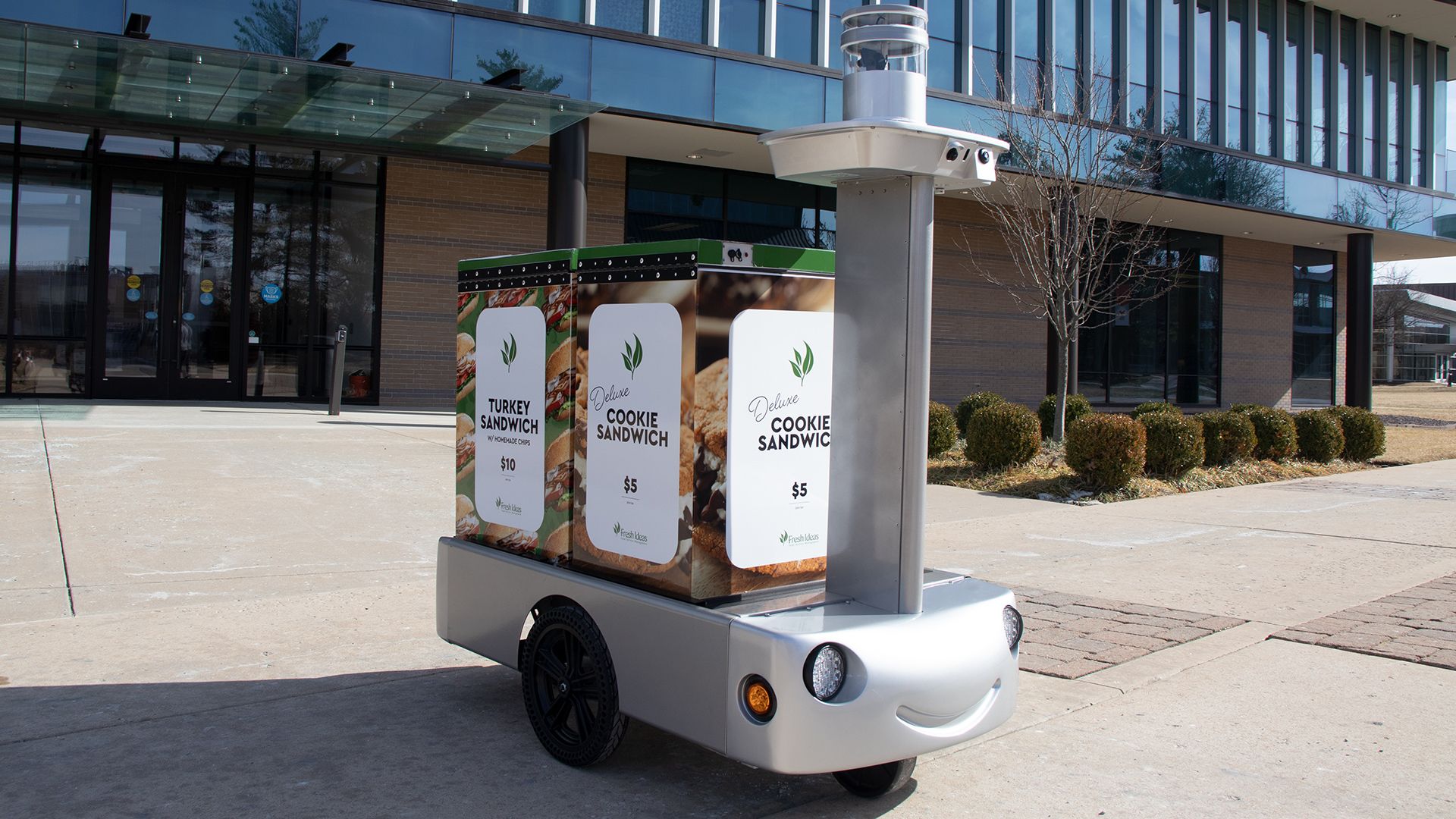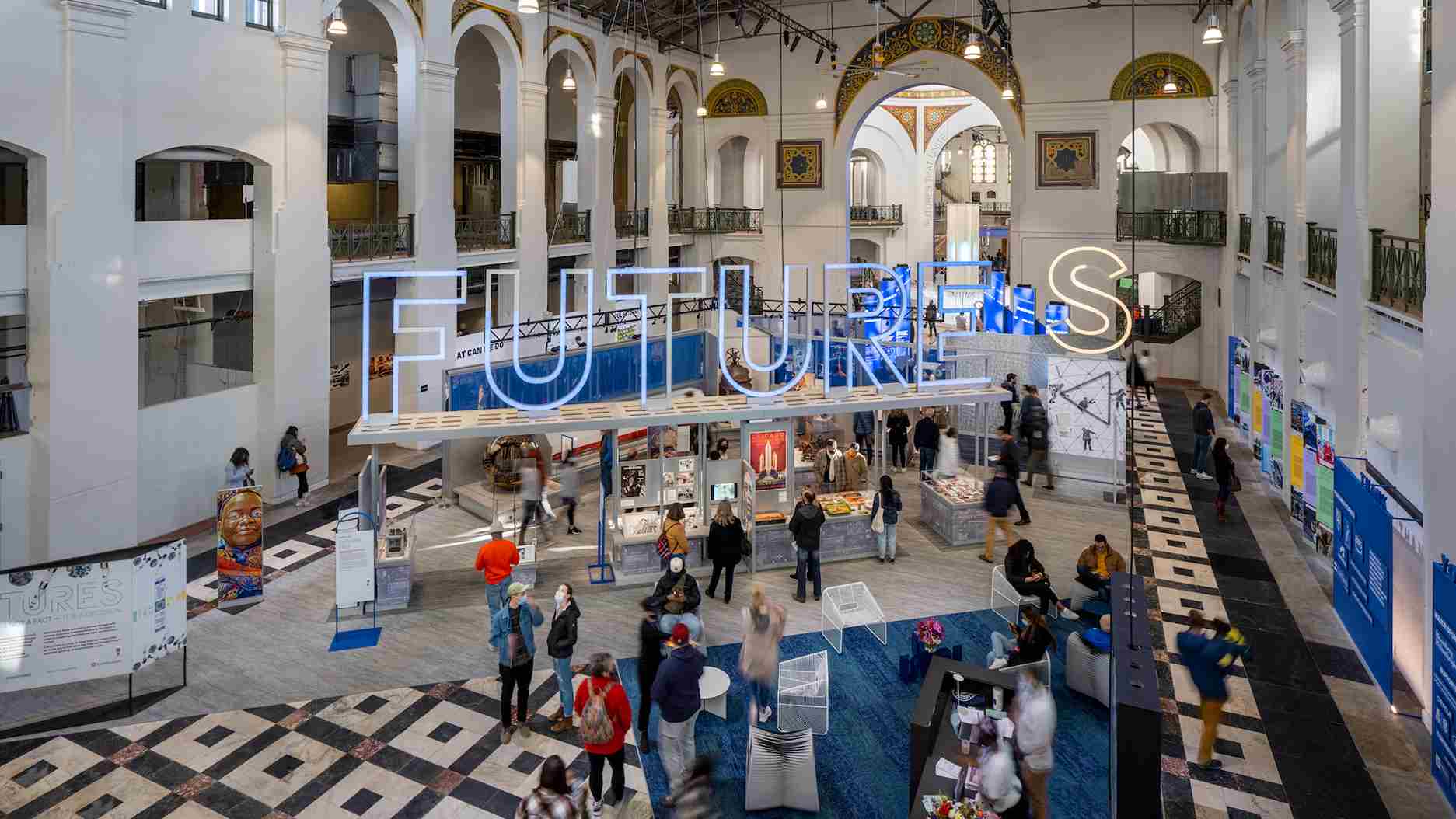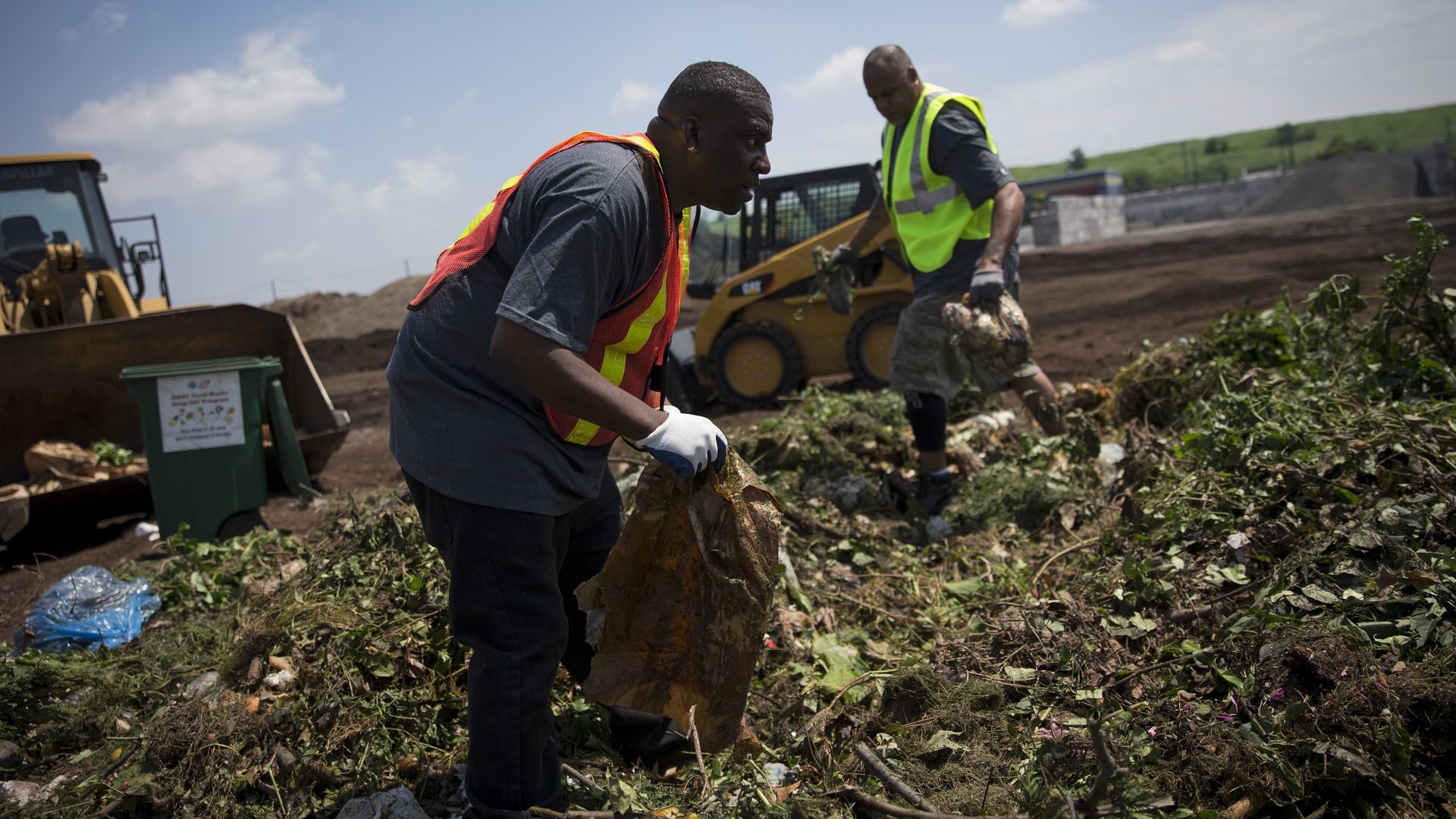| | | | | | | Presented By SoftBank Group | | | | Axios What's Next | | By Jennifer A. Kingson and Joann Muller ·Mar 16, 2022 | | Happy Wednesday! Tomorrow is St. Patrick's Day — scroll down to see how they dye the Chicago River green. - Did you know? Starbucks, which has 15,000 U.S. locations, wants to become a go-to place for people to charge their EVs, Fast Company reports.
- See something cool or interesting that speaks to the way we'll live, work, play and get around in the days ahead? Take a picture for our reader photo slot. Email us at whatsnext@axios.com.
Today's Smart Brevity count: 1,067 words ... 4 minutes. | | | | | | 1 big thing: The first remote-controlled store on wheels |  | | | Tortoise's robots are steered by operators in Mexico City. Photo courtesy of Tortoise | | | | A Silicon Valley company called Tortoise has introduced a remote-controlled robot that can sell a varied inventory — chocolates, AirPods, knee socks — from tap-to-pay containers on its back, Jennifer A. Kingson writes. Why it matters: Retailers can use the Tortoise Mobile Smart Store to generate incremental sales without having to pay someone to oversee the transaction. - Pedestrians can enjoy the novelty and convenience of buying food and accessories from a cute-looking droid, in what Tortoise calls a 15-second experience.
What's happening: Tortoise introduced its sidewalk-strolling vending machines this month with 18 retailers in the U.S. and Europe. The robots — which so far don't go on public roads but stick to private property — are steered and monitored by humans in a remote operations center in Mexico City. - People who encounter the robots can tap their credit card, open the lid and take a box of cookies (or whatever is being sold).
- Remote operators watch and listen as the transaction takes place.
- Merchants don't have to pay anything for the robots, but they must remit 10% of gross sales to Tortoise.
"This is something that when people use it, it will be the highlight of their day," Dmitry Shevelenko, co-founder of Tortoise, tells Axios. - Unlike most self-service systems, the Tortoise system doesn't require people to pre-register, download an app or scan a QR code.
- So far, the units are generating $80-$100 in hourly sales — 25 times more than a fixed vending machine, Tortoise says.
- "What we're realizing is people are willing to buy higher price point items out of this method than they are from a traditional vending machine," says Shevelenko, who previously led Uber's micromobility initiatives.
Details: Bake Sum, a bakery in Oakland, California, puts a Mobile Smart Store near its front door when it closes for the day at 1 p.m. - The Tortoise robot generates more than $100 an hour in sales from 1 p.m.-4 p.m. "on a not particularly busy street," Tortoise says.
- Bake Sum also brings the unit to local parks.
Read the full story |     | | | | | | 2. The new tech hubs |  Data: Brookings Institution and U.S. Census; Note: Metro areas with fewer than 1,000 tech workers in 2020 were excluded; Map: Kavya Beheraj/Axios A handful of fast-growing cities, including Miami, Orlando and San Diego, are claiming a bigger and bigger slice of America's tech workforce, Margaret Harding McGill, Erica Pandey and Kavya Beheraj write in Axios Login. Why it matters: The rise of remote work has provided an opportunity for new cities to lure tech talent from coastal hubs, chipping away at established tech hubs' dominance. Driving the news: Two new datasets — a report from the Brookings Institution and LinkedIn data tracking tech migration — paint a similar picture: Tech jobs flocked to a handful of new hubs, many of them in the Sun Belt, during the pandemic. - Miami was among the biggest winners: It saw a 30% increase in the net flow of workers in the software and IT sector who moved into the region in 2021, up from a 15% gain in 2020, according to LinkedIn.
- 7 of the 10 fastest-growing cities for tech worker inflows in 2021 were Sun Belt cities, including San Antonio, San Diego, Orlando and Jacksonville.
- Charlotte, Tucson and Virginia Beach saw big gains at the beginning of the pandemic, according to Brookings, as did a handful of college towns, including Lawrence, Kansas.
Read the full story |     | | | | | | 3. CD sales grow for first time since 2004 |  Data: RIAA; Chart: Jacque Schrag/Axios Dust off those plastic binders that lived in the back seat of your car and fire up the boombox because compact discs are back, writes Nate Rau of Axios Nashville. - CD sales enjoyed year-over-year growth for the first time since 2004, according to the Recording Industry Association of America's annual sales report.
- Combined with the decadelong vinyl sales explosion, overall physical music sales grew for the first time since 1996.
Why it matters: Streaming is the new lifeblood of the music industry, but physical music is enjoying a resurgence that can no longer be dismissed as a passing fad driven by hardcore collectors. By the numbers: Physical music sales exploded to the tune of $1.65 billion in the U.S. last year, according to the RIAA data. - CD sales grew to $584.2 million nationally last year, up more than $100 million from 2020. By comparison, 2021 vinyl sales increased to $1 billion annually, up from $643.9 million.
Read the rest |     | | | | | | A message from SoftBank Group | | Creating a more empowered, connected future | | |  | | | | SoftBank Group — a global investor in AI and transformative technology — is proud to support the Smithsonian's FUTURES exhibit, at the Arts + Industries Building through July 6. Come experience this interactive, cutting-edge technology journey, and be part of creating a better future. | | | | | | 4. What we're reading |  | | | Workers at WeCare Organics separate compostable materials in Staten Island. Photo: Scott Eells/Bloomberg via Getty Images | | | | New York was set to expand composting. Now it's on the chopping block. (New York Times) - New NYC Mayor Eric Adams "wants to save $18.2 million in his first budget by halting the re-introduction and expansion of curbside compost pickup," infuriating climate change activists. Composting keeps food waste from going into landfills, where it emits methane.
How book lovers on TikTok are changing the publishing industry (Fast Company) - A pandemic-era subculture called #BookTok offers recommendations and reviews — and has vaulted sales of books overall, according to NPD BookScan, which says that 825.7 million print books were sold in 2021 vs. 757.9 million in 2020.
Is an international crime operation targeting the Bay Area's wealthiest cities with "burglary tourism?" (San Francisco Chronicle) - The police are attributing a wave of house burglaries to "an international crime operation rooted in South America" that has "infiltrated tony neighborhoods in the Bay Area."
- The thieves come to the U.S. as tourists, "stake out homes in affluent communities, shatter a window to get inside and flee with a safe, designer handbags or high-end jewelry, ignoring electronics and other items easier to trace."
|     | | | | | | 5. Dye me a river |  | | | An aerial picture shot with a drone shows the Chicago River after it was dyed green in celebration of St. Patrick's Day on March 13, 2021. Photo: Scott Olson/Getty Images | | | | How do they dye the Chicago River green for St. Patricks's Day? - The answer: 40 pounds of colored dye — which starts out as an orange powder and is said to be environmentally friendly.
What's happening: Each year since 1962, the Chicago River has been dyed green in honor of St. Patrick's Day, which is tomorrow. The color lasts a day or two. - "The dyeing of the Chicago River is the work of Chicago Plumbers Union Local 130," reports ABC7 Chicago, which offers a guide to watching it happen.
- "They use a proprietary dye to turn the Chicago River green in three boats, two with the secret sauce and a chaser vessel to mix it up," reports ABC7.
- "The dye is essentially food coloring concocted by the plumbers years ago to help trace leaks in buildings."
Fun fact per Thrillist: "The crew once used 100 pounds back in 1962, and the river was green for an entire week. After that, they lowered it to 25 pounds, and it's now back up to 40 as the recipe has been perfected." |     | | | | | | A message from SoftBank Group | | Accelerating human progress through technology | | |  | | | | At SoftBank Group, we invest in companies that accelerate human progress through technology. That's why we're proud to support the Smithsonian's FUTURES exhibit, which challenges us to envision how technology can enable a more empowered, connected world. | | | | Was this email forwarded to you? Get your daily dose of What's Next magic by signing up for our free newsletter here. |  | It's called Smart Brevity®. Over 200 orgs use it — in a tool called Axios HQ — to drive productivity with clearer workplace communications. | | | | | | Axios thanks our partners for supporting our newsletters. If you're interested in advertising, learn more here.
Sponsorship has no influence on editorial content. Axios, 3100 Clarendon Blvd, Suite 1300, Arlington VA 22201 | | | You received this email because you signed up for newsletters from Axios.
Change your preferences or unsubscribe here. | | | Was this email forwarded to you?
Sign up now to get Axios in your inbox. | | | | Follow Axios on social media:    | | | | | |










No comments:
Post a Comment